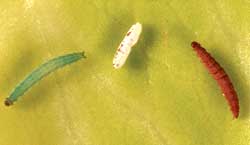Deadly quick
 a recent discovery could help overcome a limitation of biopesticides. These insect repellents, based on microorganisms like Bacillus thuringiensis, are far better than their chemical counterparts, as they do not pollute environs. But to be effective, they need to be ingested, which takes a long time. In addition, there is also the possibility of resistance building up in the insect community.
a recent discovery could help overcome a limitation of biopesticides. These insect repellents, based on microorganisms like Bacillus thuringiensis, are far better than their chemical counterparts, as they do not pollute environs. But to be effective, they need to be ingested, which takes a long time. In addition, there is also the possibility of resistance building up in the insect community.
Myco-insecticide sprays are a variety of biopesticide that have no such drawbacks. They contain fungal spores that settle on the insect's cuticle to germinate; thereafter, they penetrate and kill their host within four to seven days. To date, there is no documented evidence of insects developing resistance to these sprays.
The main barrier to penetration is the chemical composition of the cuticle
Related Content
- Integrated assessment of air pollution and climate change for sustainable development in Africa
- Extreme heat: preparing for the heatwaves of the future
- The safe waste treatment for COVID-19: Lessons from the Republic of Korea
- Signs of drug resistance found in new bird flu strain after H7N9 kills 94 in China this year
- Air quality benefits of odd-even vehicle rationing programme in Delhi: An analysis of week 1
- On World Environment Day, CSE warns no one is safe from deadly ozone pollution-- including chief minister Arvind Kejriwal
